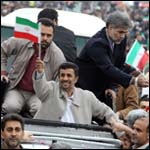Roula Khalaf, et al. | Financial Times
Majid Shahriyari became an Iranian martyr while he was driving to work on an autumn day in Tehran. As he made his way along Artesh Boulevard, an explosive device ripped through his car. The 45-year-old was a devout man: Iranians would describe him as a Hizbollahi, a person fiercely loyal to the country's Islamic system and easily identified by his unshaven face and simple clothes. But Shahriyari also stood out for another reason. He was one of Iran's leading atomic scientists, an expert on nuclear chain reactions. |
|
|
Jonathan Fildes | BBC News
A powerful internet worm repeatedly targeted five industrial facilities in Iran over 10 months, ongoing analysis by security researchers shows. Full Article
Fredrik Dahl | Reuters
Syria may build its first nuclear power plant by 2020 to meet growing energy demand, a document showed, despite international concern over Syrian stonewalling of a U.N. probe into allegations of covert atomic activity. Full Article
Global Security Newswire
The Obama administration's fiscal 2012 budget request calls for the United States to replace the land-, air-, and sea-based components of its nuclear deterrent, potentially setting the nation on a course that could cost hundreds of billions of dollars over five decades. Full Article
Alexander H. Rothman and Lawrence J. Korb | Bulletin of the Atomic Scientists
While Pakistan's nuclear buildup may be jarring at first glance, it is important to take a moment to examine what this development means and what it does not. Pakistan's entry into the "nuclear 100 club" does little to change the strategic situation in South Asia, nor does this determined pursuit of nuclear weapons signal a major policy shift in Pakistani behavior. Full Article
World Nuclear News
Residents of the Swiss canton of Bern have expressed their support for the construction of a new nuclear power plant at Muhleberg in a local referendum, but Nidwalden residents registered their opposition to a nuclear waste repository. Full Article
|


